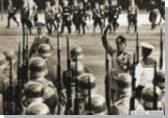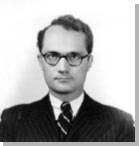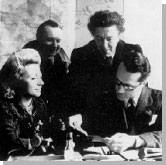|
Varian Fry knew trouble was coming. Adolph Hitler and
his Nazi party had taken control of Germany in 1933. Now
they had begun a brutal campaign of persecuting the Jews.
Fry saw this for himself when he was visiting Germany in
1935. Again and again, Fry, a writer from New York City,
saw how the Nazis went after Jews. He saw bloody riots staged
against them. Once he saw a Nazi soldier pin an old Jewish
man’s hand to a table with a knife. Then the Nazi pulled
out the knife and walked away, laughing. After that, Fry,
who was not a Jew, decided that he would fight to save Jews
from Nazi horror if he ever had the chance.
 That chance came in 1940, one year after World War II
broke out. By then, the Nazis had conquered France. They
ordered French officials to “surrender on demand ” any Jew
or Nazi enemy. Such people were to be turned over to the
Nazi police, called the Gestapo.
That chance came in 1940, one year after World War II
broke out. By then, the Nazis had conquered France. They
ordered French officials to “surrender on demand ” any Jew
or Nazi enemy. Such people were to be turned over to the
Nazi police, called the Gestapo.
At this time, the U.S. was still at peace. It did not
join the war until the end of 1941.Still, many Americans
wanted to help those trapped by the Nazis. Some of them
formed the Emergency Rescue Committee. Its main goal was
to get Jewish artists and writers out of France. The committee
needed someone to go to France to oversee this effort. The
person would risk arrest, torture, and maybe death. Fry
had no training for this kind of rescue work. Nonetheless,
he volunteered to go. He later wrote, “…I could not remain
idle so long as I had the chance at all of saving even a
few of [Nazi Germany’s] intended victims.”
Fry was an unlikely hero. He had never done anything brave
in his life. He certainly didn’t look heroic. Fry was a
thin 32-year-old who suffered from ulcers. He was a bookworm
and a bird watcher. “All I [knew] about trying to outsmart
the Gestapo,” he wrote, “[was] what I’d seen in the movies.”
Still, in August of 1940, Fry flew to the French port
city of Marseilles. He had with him a list of 200 specific
people he would try to save. He had exit visas
to get each of them out of France. He also had $3,000 wrapped
around his legs. Fry had planned on staying for just three
weeks. But the rescue effort proved so demanding and the
need was so great, he stayed for 13 months. “I stayed because
the refugees needed me,” he later explained. But it took
courage, and courage [was] a quality I hadn’t previously
been sure I possessed.”
Fry set up his office in a local hotel, By day, he ran
a simple -–and legal -–relief agency. His American Relief
Center helped people get food, money, and visas. At night,
however, Fry did real work. With the help of a complex  network,
he arranged the escape of the 200 people on his list. He
also helped nearly 2,000 others flee the Nazis. network,
he arranged the escape of the 200 people on his list. He
also helped nearly 2,000 others flee the Nazis.
It was hard to get out of Marseilles in 1940. All exit
terminals were watched by the police. With the right papers,
some of Fry’s “clients” managed to leave by train or boat.
Most, however, had to sneak
out of France. Often they had to be disguised as farm laborers.
They carried their possessions on lunch boxes and climbed
a secret escape route over the Pyrenees Mountains and into
Spain.
Fry not only saved people, but he also saved great works
of art. Some of these pieces he smuggled
out of the country himself. He once took 12 suitcases by
train across the border to Spain. In the suitcases was the
original score
of Anton Buckner’s Third Symphony.
Fry, of course, was putting his life on the line. As
a citizen of the neutral United States, he had little to
fear if he followed Nazi rules. But he didn’t follow them.
Night after night he broke the law to aid his refugees.
He met with a cartoonist from Vienna who agreed to forge
I.D. cards. He raised money on the black market. He kept
a map of his secret escape routes pinned to the wall behind
a mirror in his hotel room.
The police suspected Varian Fry was up to something.
They watched him closely. A few times they even brought
him in for questioning. So Fry had to be careful. He masked
conversations he had in his hotel room by running water
in the sink. He got rid of secret papers by burning them
in train station bathrooms. He even stuffed secret messages
into hollowed-out toothpaste tubes.
At last, in September 1941, Varian Fry was ordered out
of France. He was labeled an “undesirable alien”,
When he asked the police why they were kicking him out,
one of them said, “Because you have protected Jews and anti-Nazis
”

Back in the United States, Fry tried to alert U.S. officials
to the plight
of the Jews under the Nazis. But few people listened to
him. Miriam Davenport, who worked with Fry in France, explained
why. She said, “We were still pretty anti-Semitic in this
country at that time. A lot of people just didn’t want to
hear his story.”
Varian Fry died in 1967. At the time he was teaching
Latin at a school in Connecticut. Shortly before he died,
the French gave him a Legion of Honor award. Later, in 1991,
the U.S. honored him with the Eisenhower Liberation Medal.
But his greatest tribute
came from the Jews themselves. Israel named him “Righteous
Among the Nations.” This award is given to non-Jews who
risked their lives to save Jews. Varian Fry was the first
American to win it. As Susan Goodman, the curator of the
Jewish Museum in New York, said,” His story shows any person
can be a hero.”
↑TOP
|